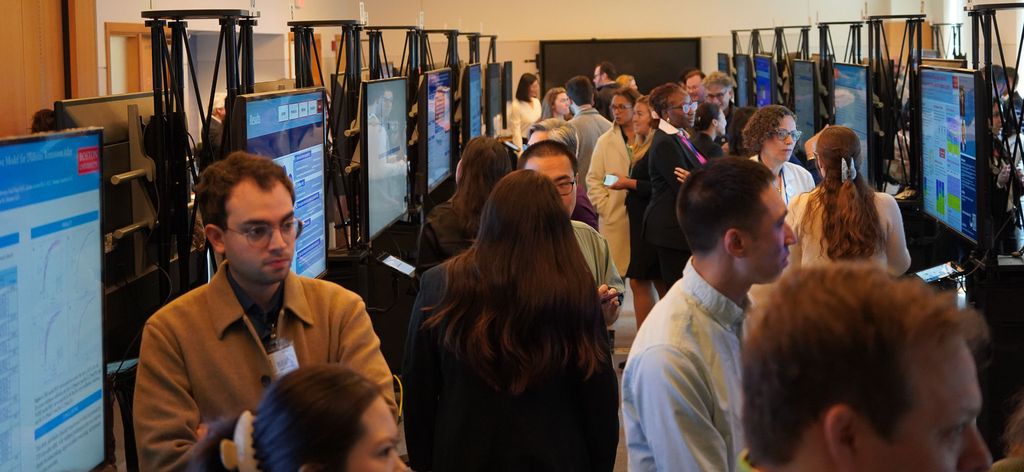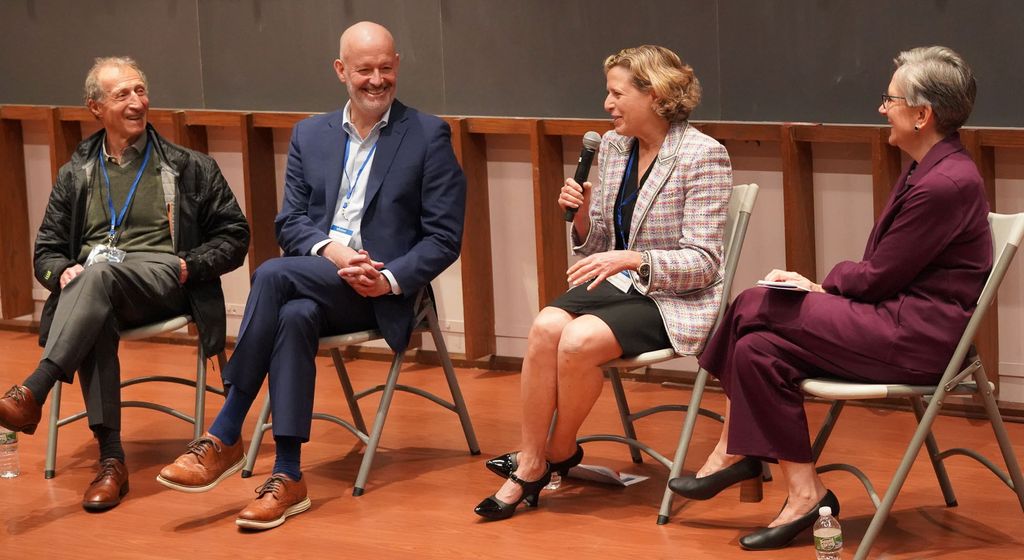Evans Days Highlights Depth of Research Across Department of Medicine, BU and BMC
Department of Medicine Chair Vicki Jackson, MD, MPH, circulated among the crowd of people at an Evans Days poster exhibition session, stopping before the screens displaying research posters to engage with the trainees as they explained the project they were working on.
“It is such an opportunity to be able to highlight the amazing research, across the spectrum, that’s happening in our department at BU and BMC (Boston Medical Center),” said Jackson.
 Crowds of people viewed a record 174 Evans Days research projects.
Crowds of people viewed a record 174 Evans Days research projects.
“We had a record number of 174 abstracts submitted by trainees this year,” said David Salant, MBBCh, professor of medicine, the department’s vice chair for research and chair of the Evans Days organizing committee. Salant was impressed by the quality of the work being presented and the difficulty the judges had in selecting winners in the basic and clinical science categories. He noted the “remarkable attendance at the poster and oral presentation sessions and the sense of energy in the room.”
The annual Evans Department of Medicine Research Days was founded in 1985 to acknowledge and foster the research of the department of medicine. The Evans Endowment was established in 1912 with a series of gifts from Marie Antoinette Evans. Celebrating its 40th year, Evans Days was held Oct. 15-17 with competitions in oral presentations and poster displays as well as lectures by faculty and distinguished visiting professors. The poster competition encompassed the research of trainees and faculty from the department of medicine and collaborators across both the Medical and Charles River campuses.
 L to r: Chair of the Evans Days organizing committee David Salant, MBBCh, Wilkins Visiting Professor Benjamin Humphreys, MD, PhD, Ingelfinger Visiting Professor Jean Kutner, MD, MSPH and Department of Medicine Chair Vicki Jackson, MD, MPH in a Q&A session at Keefer Auditorium.
L to r: Chair of the Evans Days organizing committee David Salant, MBBCh, Wilkins Visiting Professor Benjamin Humphreys, MD, PhD, Ingelfinger Visiting Professor Jean Kutner, MD, MSPH and Department of Medicine Chair Vicki Jackson, MD, MPH in a Q&A session at Keefer Auditorium.
“It was especially energizing to spend this morning with so many talented young people who are doing amazing work. You all should be extraordinarily proud because there is some great mentoring going on here, and great collaborative work, and it makes me feel like the future is bright,” said Wilkins Visiting Professor Benjamin Humphreys, MD, PhD, Joseph Friedman Professor of Renal Diseases in Medicine and chief of nephrology at Washington University. Humphreys delivered a lecture on “Acute Kidney Injury, Repair and Transition to Chronic Kidney Disease.”
Ingelfinger Visiting Professor Jean Kutner, MD, MSPH, chief medical officer at the University of Colorado Hospital and Distinguished Professor of Medicine at University of Colorado School of Medicine also visited the poster sessions, spoke with trainees and helped judge oral presentations. Her lecture at Medical Grand Rounds was “Serious Illness Requires Serious Science: Advancing Care Through Evidence Generation, Investigator Development, and Infrastructure Creation.”
Another highlight of the event was the presentations by this year’s recipients of the David Coleman, MD, Junior Faculty Prize to Nicholas Bosch, MD, MSc, assistant professor of pulmonary, allergy, sleep & critical care medicine, for clinical research, and Jessica Fetterman, PhD, assistant professor of vascular biology, for basic research.
“You want to make sure you’re using the safest and most optimal treatment for (patient) health and well-being. I feel like you don’t get those answers until you have evidence-based research to support it,” said Sabreen Bhuiya, MD, MPH, a first-year resident in internal medicine at BMC, who presented research she is doing with Nicholas Bosch, analyzing a database of U.S. hospitalizations to guide future studies determining effective treatments for septic shock.
“Research is fundamental to advancing medicine. We can’t accept the way things are today, we always have to think about how we can improve our patient outcomes, and research is a way we can do that,” said Danielle Davis, MD, a chief resident at BMC. Her Evans Day presentation was on the impact of psychosocial stress on heart disease, particularly in Black women.
Recent MS in Medical Sciences (MAMS) graduate Arathi Ranga, MS’24, is a research assistant in the lab of Vipul Chitalia, MD, PhD’08. Her project involved peripheral artery disease (PAD), which is common in patients with chronic kidney disease and increases the likelihood of lower limb complications and death. Her team found that inhibiting a particular enzyme promoted the formation of new blood vessels hopefully combatting the adverse effects of PAD.
“I didn’t do any wet lab research until I did my MAMS thesis,” said Ranga, who is applying to medical schools this year. “That’s when I realized that I loved doing research and why I decided to take another year following graduation to dedicate to research.”
Hollis Day, PhD, MS, BMC chief of geriatrics and an associate professor of medicine, saw Evans Days as a way for young researchers to hone their presentation skills and to network. “It’s always an opportunity to really shine, and to showcase the work that you’ve been doing,” said Day.
“The more opportunities I have to talk about my research with people (who are unfamiliar with the science) helps me learn how to communicate when I do have to get up and present on a bigger stage,” said Henry Sun, a third-year PhD student investigating the biology and regeneration of human airways at the Center for Regenerative Medicine.
“It’s great to see the other impactful research that’s being done that you don’t see working in your own lab every day,” said Andrew Berical, MD, MA, assistant professor of medicine, who had volunteered to judge the poster contest.
Berical participated in Evans Days poster competitions when he was a research fellow at BU.
“It helped me validate what I was doing, that it wasn’t so esoteric, that it did have importance, which made me feel better emotionally,” he said.
Click here for a full list of Evans Days contest winners and awards.